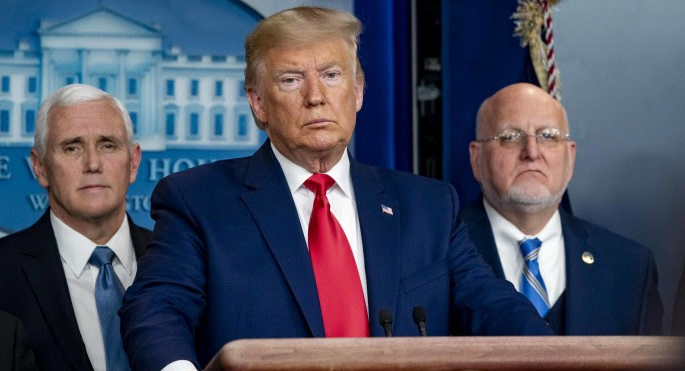Trump in the Time of Coronavirus
As the world faces a pandemic, a dubiously performative president of the United States sets the stage.
Lisa Van Dusen/For the Hill Times
March 4, 2020
Because we’ve lately seen the rise of political rhetoric characteristic of totalitarian states both fictional and not but unprecedented in Western democracies, with the public sphere being divided into normal (the air quotes will go up at some point, perhaps in January 2021) events and post-truth narrative manipulation, this column opens with a disclaimer: The public health crisis unleashed by the global coronavirus contagion is not a hoax.
The coronavirus has been spreading toward an official pandemic declaration for weeks, a status unchanged at time of writing but that may have been updated by publication. People have died and more people will, stock markets—which have otherwise been so decoupled from matters of public well-being since the post-web contagion of algo-trading, naked shorting, flash crashing, and other exotic distortions—have been concussed. Public events, from concerts to annual meetings, have been cancelled everywhere. Schools in Japan are closed. Le Louvre est fermé. There have not yet been reports of fistfights at Walmart over the last jumbo Purell dispenser but, again, that may be old news by the time you read this.
At the same time, because the management and containment of pandemics is a measure of government competence, this crisis cannot be considered separately from its current political host organism, which, at least in the United States and other key international datelines, is pre-infected by a political contagion that could unnecessarily complicate an already precarious situation because it commodifies fear, uncertainty, and division.
Which is not at all the same thing as a hoax. Some people like to pre-emptively discredit criticism and disarm doubt about the choice architecture impacting certain high-value narratives by using the word “hoax.” It’s not always even clear whether the term refers to the original event, the evolution of the event, or the coverage of that evolution, but the deployment of the word is evidently believed to be sufficient to activate a smoke bomb of tactical bafflement.
The issue with the coronavirus is not whether it is a hoax. Does anyone really think China—in an elaborate world domination ruse to deflect from its own economic and geopolitical problems and to unleash monumental consequences from a Malthusian population cull to a global recession to a U.S. presidential campaign derailed by a disaster-movie contagion—launched an outbreak in a Wuhan fishmonger’s on New Year’s Eve and then silenced the doctor trying to raise the alarm? Is that really what Donald Trump means when he cries “hoax”? Is this the birth of germerism?
The fact that one never really knows is the issue. In the pre-Trumpian, pre-post-truth context, global outbreak responses were led by the World Health Organization as the lead United Nations agency—as this one has been—but the tone was set by the president of the United States based on science from the Centers for Disease Control, among other sources of expertise. That role, which includes a combined responsibility of telling America and the world the truth without unleashing panic that could cause more social and economic damage than the epidemic itself, requires two characteristics that used to be included with presidential-grade politicians: trustworthiness and temperament. Trust, especially on questions of life and death, means not just believing what you’re hearing but trusting that the person saying it isn’t acting out of self-interest, including for the benefit of unseen parties. For temperament, see the previous incumbent’s response on the 2014 Ebola outbreak.
As with everything Trump says and does, the problem isn’t so much the words and deeds, as the damage they could both catalyze and rationalize. From a guy who has used unpredictability as a dramatic device and embraced chaos as a branding element, nothing could be more potentially, avoidably chaotic than a mismanaged pandemic.
Lisa Van Dusen is associate editor of Policy Magazine and a columnist for The Hill Times. She was Washington bureau chief for Sun Media, international writer for Peter Jennings at ABC News, and an editor at AP in New York and UPI in Washington.

